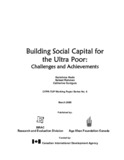| dc.description.abstract | BRAC introduced a program designed to meet the special needs of the extreme poor called Challenging the Frontier of Poverty Reduction: Targeting Ultra Poor (TUP) program in 2002. The program consists of economic and health inputs designed to create sustainable livelihoods. However, it was felt that the assets they received might be vulnerable to theft and damage. To offset this potential problem, BRAC created local institutions of village elites called Gram Shahayak Committees (GSCs) or Village Assistance Committees. The GSCs were designed to offer support, guidance and protection for the program participants. Based on original research, this qualitative study explores the hypothesis that such mediation may provide a form of social capital that did not previously exist, promoting the further development of TUP members. But do GSCs constitute an effective source of social capital for TUP participants? To address this question, we defined effective social capital as a combination of horizontal and vertical relationships, which provide the poor with access to the agency capacity necessary to respond to crises and maintain a sustainable livelihood and grant them an independent voice. The study explores the extent to which the GSC fills a gap between the ultra-poor and the village elites, creating new vertical linkages between them and thereby new forms of social capital. However, the study also finds that the relationships appear to reinforce traditional dependency interactions. This condition can be attributed to the lack of horizontal networks among the TUP members themselves, keeping this social capital from being truly effective. BRAC should therefore ensure that a sense of public goodness is created among GSC members, GSC members focus on community-based aid for TUP members, the TUP representative on the GSC communicates TUP members’ collective problems, and BRAC POs mobilize TUP members to voice demands that benefit them as a group. | en_US |

